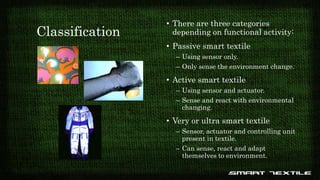Smart textile
- 2. Presented by Name: Mahbubul Alam ID: 12132107072 Intake: 8th Section: 02 B.Sc. In Textile Engineering, BUBT To Md. Mahbub Hasan Assistant professor & chairman Department of Textile Engineering, BUBT
- 3. Smart textile • Smart textiles means intelligent textiles. • During the last decade, textiles have entered a new era, one of the is smart textiles. • It can sense and react to environmental condition or stimuli. • It can also sense and respond in a predetermined way.
- 4. Components • There are three components in smart textile material – Sensor • Sensors provide a nerve system to detect signals. – Actuator • Actuators act upon the signals. – Controlling Units • Controlling Units produce an appropriate output.
- 5. Classification • There are three categories depending on functional activity: • Passive smart textile – Using sensor only. – Only sense the environment change. • Active smart textile – Using sensor and actuator. – Sense and react with environmental changing. • Very or ultra smart textile – Sensor, actuator and controlling unit present in textile. – Can sense, react and adapt themselves to environment.
- 6. End Use • Smart textile used for the following broad categories: – Heat protection – Medical application – Military application – Fashion – Comfort wear – Aviation – Space research This garment is used to monitor ECG waves and Heart rate levels. This can be used for sports, fitness, and medical purposes Spacesuit Technology
- 7. Methods of making smart textile • Components of smart textile may be acting from fiber optics, phase change material, shape memory material etc. • Those components from an integrated part of textile structure and can be incorporated into the substrate at any of the following levels. – Fiber spinning level – Yarn / Fabric formation level – Finishing level
- 8. Sensor for recording • Life shirt which are weaved by special technique with optical fiber. • This optical fiber transmit human physiological parameter. • Also intelligent shirt monitors presence of poisonous gases in the air and protect human body from it.
- 9. Sensor for recording • In construction, sensor laid in composite structures can be used to: –Monitor strain and temperature through out a composite structure –Detection of crack in composite structure –Monitor concrete structure.









